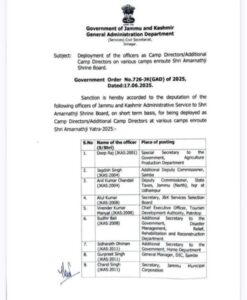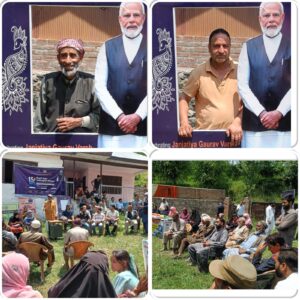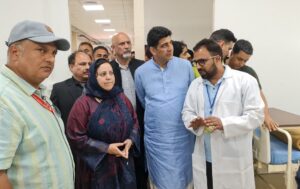“No More Arbitrary Pricing”; Horticulture Department To Import High-Density Plants Directly, Says Director Vikas Anand
Srinagar: Director Horticulture, Vikas Anand, said that in order to end the arbitrariness of approved private companies, the department will now import high-density fruit plants directly from this year. This includes not just apple saplings but also walnut, almond, hazelnut, and cherry varieties. He said the government made this decision in view of the growing trend of high-density orchards and the increasing supply-demand gap in plant availability.

He said the private companies approved by the department are unable to supply high-density Italian apple plants to orchardists on time due to growing demand. As a result, many farmers converting traditional orchards into high-density ones are left waiting for years. Ironically, he said, even when plants arrive, they are often found to be substandard and diseased.
“As a result, farmers are not only wasting money but also losing valuable time,” he added.
The Director said that moving forward, the department will ensure the import of high-quality and disease-free plants—including apples, walnuts, almonds, hazelnuts, and cherries—so that orchardists converting to modern horticulture can benefit fully. To support this shift, nurseries are also being set up with assistance from a Central Government scheme.
“With this initiative, the arbitrariness of registered private companies will end, and farmers will be able to access better quality saplings on time,” he said.
Responding to a question, Anand acknowledged an earlier news report from Pulwama district highlighting the supply of diseased saplings from Lariyar Tral village. He confirmed that a departmental team had verified that a private firm named FruitWall had supplied canker-affected apple saplings to a local orchardist. Following this, the department issued a show-cause notice to the company and initiated action.
“The company has been directed to replace the entire consignment with healthy saplings and bear the cost of medicines as per the agreement, which makes the company responsible for three years,” he said.
When asked about the quality control process for imported plants, Anand said that while a central team comprising a Plant Protection Officer from the Government of India and an expert from Sher-e-Kashmir University of Agricultural Sciences and Technology (SKUAST) inspects consignments abroad, no Horticulture Department expert is currently included in that team. However, once plants arrive in Kashmir, they are inspected again by a team under the District Horticulture Officer before distribution to farmers.
When questioned how substandard plants are still reaching orchard owners despite these checks, Anand said that action is being taken to identify lapses within the department.
It is worth mentioning that to boost profitability in the horticulture sector in Kashmir, authorities have encouraged the adoption of high-density Italian apple plants. The trend has gained traction in recent years, with a steady rise in high-density apple orchards across the Valley.
Although the government offers a 50 percent subsidy on high-density plants imported from Italy, many farmers allege that they are being exploited by the same government-approved private companies.





